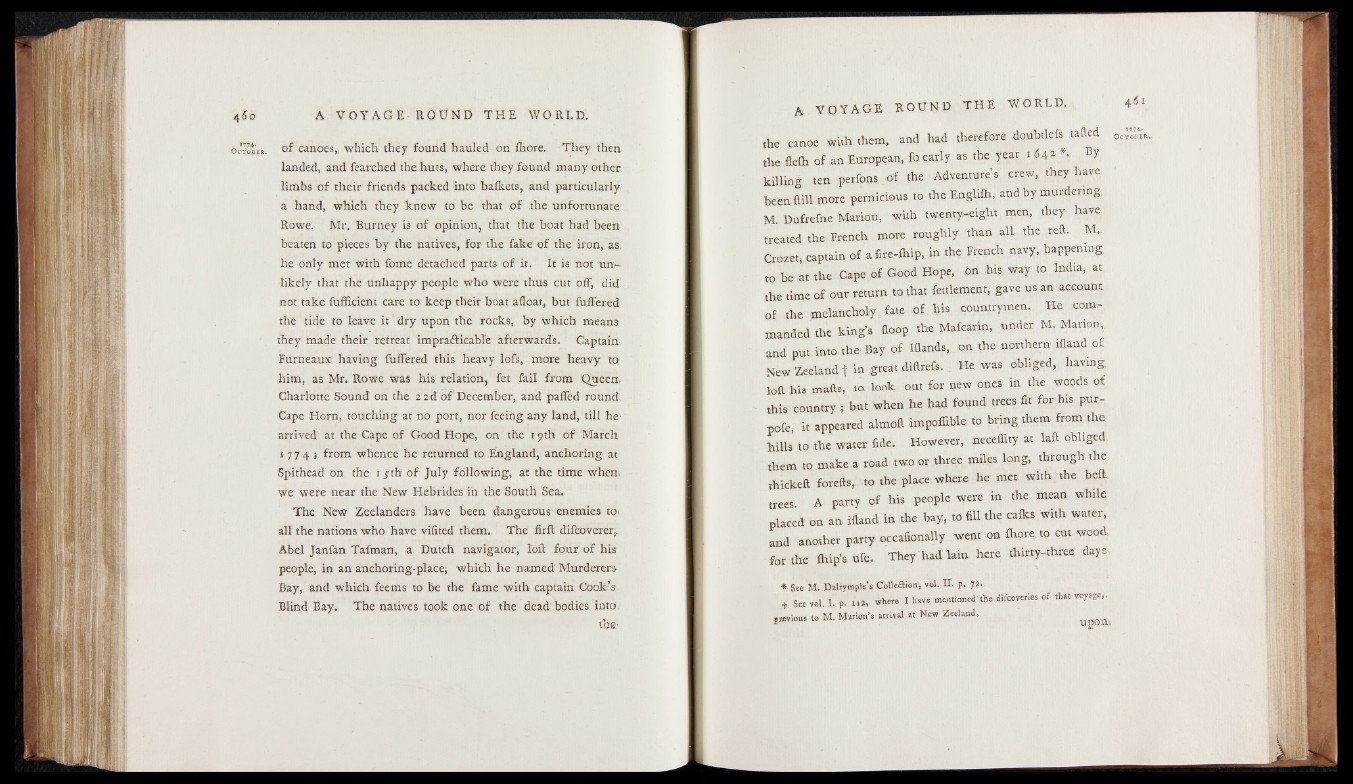
'7/4-
O ctober. of canoes, which they found hauled on fhore. They then
landed, and fearched the huts, where they found many other
limbs of their friends packed into balkets, and particularly
a hand, which they knew to be that of the unfortunate
Rowe. Mr. Burney is of opinion, that the boat had been
beaten to pieces by the natives, for the fake o f the iron, as
he only met with fome detached parts of it. It is not unlikely
that the unhappy people who were thus cut off, did
not take fufficient care to keep their boat afloat, but fuffered
the tide to leave i t ' dry upon the rocks, by which means
they made their retreat impracticable afterwards. Captain
Furneaux having fuffered this heavy lofs, more heavy to
him, as Mr. Rowe was his relation, fet fail from Queen.
Charlotte Sound on the 2 2d of December, and paffed round.
Cape Horn, touching at no port, nor feeing any land, till he
arrived at the Cape of Good Hope, on the 1 9th of March.
1774; from whence he returned to England, anchoring at
Spithead on the 1 5 th of July following, at the time wheni
we were near the New Hebrides in the South Sea;
The New Zeelanders have been dangerous enemies toi
all the nations who have vifited them. The firft difcoverer,
Abel Janfan Tafman, a Dutch navigator, loft four of his
people, in an anchoring-place, which he named' Murderers
Bay, and which feems to be the fame with captain Cook’s
Blind Bay. The natives took one of the dead bodies into
thethe
canoe with them, and had therefore doubtlefs tailed
the flelh of an European, fo early as the year 1642 . By
killing ten perfons of the Adventure’ s crew, they have
been ftill more pernicious to the Englilh, and by murdering
M. Dufrefne Marion, with twenty-eight men, they have
treated the Erench more roughly than all the reft. M..
Crozet, captain of afire-lhip, in the French navy, happening,
to be at the Cape of Good Hope, on his way to India, at
the time of our return to that fettlement, gave us an account
of the melancholy , fate of his countrymen. He com.-
manded the king’s Hoop the Mafcarin, under M. Marion,
and put into the Bay of Iflands, on the northern ifland of
New Zeeland ’& in great diftrefs. He was obliged, having,
loft his mails, to. look out for new ones in the woods of
this country ; but when he had found trees fit for his pur-
pore, it appeared almoft impoffible to bring them from the
hills to the water fide. However, neeeffity at laft obliged,
them to make a road two or three miles long, through the
thickeft forefts, to the place where he met with the belt,
trees. A party of his people were in the mean while
placed on an ifland in the bay, to fill the calks with water,.
and another party occafionally went on fhore to cut. wood.
for the fhip’sufe. They had lain here thirty-three days,
*■ See M. Dairy tuple’s Colle&ion, vol. II. p. 721
t See vol. I. p. 112,. where I have mentioned'thn difcoveriesof'thatvoyage,.
previous to M. Marion’s arrival.at.New Zeeland.,
1774-
October-.-
ugoni